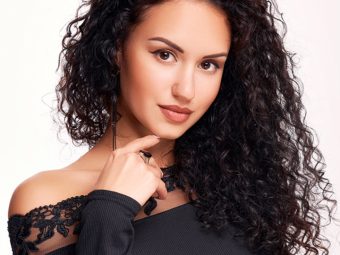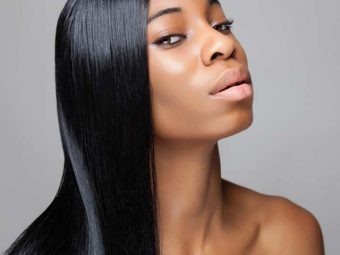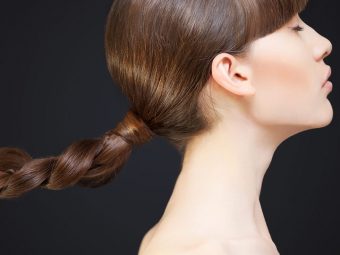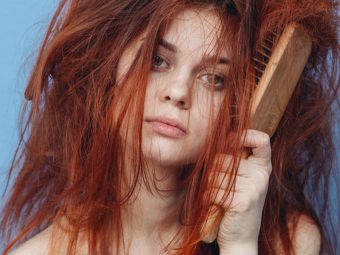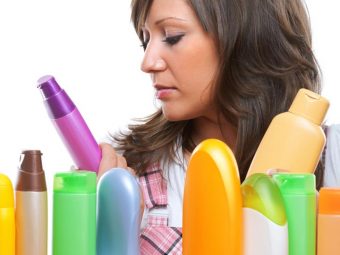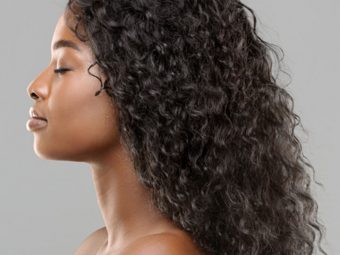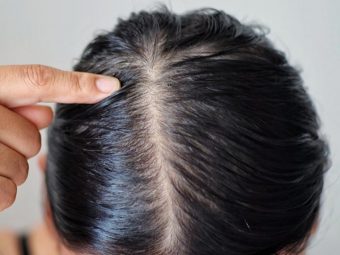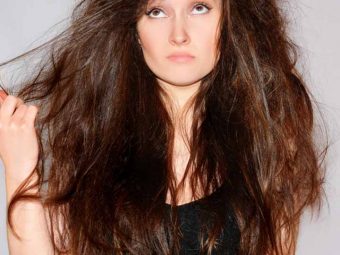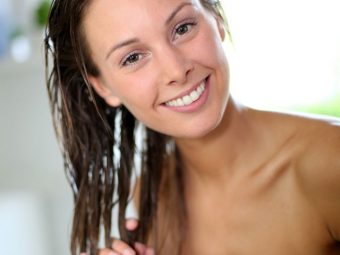Biotin For Hair: What Is It, Benefits, And How To Use It
This vitamin supplement can strengthen your hair and benefit your brittle nails too.

The beauty community is well aware of the benefits of biotin for hair growth, thanks to celebrities like Kylie Jenner and Vanessa Hudgens. It is also known as vitamin H and is often prescribed by doctors. However, unregulated use of biotin may cause more harm than good.
This article explores the truth behind the benefits of biotin for hair, how it works, and its risks. Read on to know more.
In This Article
What Is Biotin?
Biotin is a water-soluble B vitamin and a coenzyme for carboxylase enzymes regulating amino and fatty acids and glucose (1). In other words, biotin helps convert nutrients into energy and is crucial for maintaining body processes and overall health.
Biotin naturally occurs in foods and is available as dietary supplements. It plays a vital role in maintaining your hair health.
Biotin For Hair: What Does Research Say?
Biotin does play a role in maintaining nail and hair health. While the exact mechanism is not yet clear and needs further studies, a few clinical studies found it beneficial.
- A case review has found that biotin helps in protein synthesis and boosts keratin production. This strengthens the hair strands and promotes healthy nails (2).
- The same review suggests that biotin deficiency is a typical symptom of alopecia (hair loss) and other issues like seborrheic dermatitis and eczematic skin rashes (2).
- A study revealed that low serum biotin levels could cause diffuse telogen effluvium (hair fall) (3).
- Biotin supplement (5 mg/day) can improve uncombable hair syndrome. This syndrome causes dry and frizzy hair that cannot be combed flat (4).
Biotin can promote hair growth if the hair fall is caused by biotin deficiency. Usually, the body receives its daily dose of biotin from food (discussed later in the article). Hence, before taking biotin supplements, consult a dermatologist or trichologist to determine the reasons for hair fall. It may be caused by:
- Nutritional deficiencies
- Scalp infection
- Underlying health condition
- Pregnancy
- Aggressive hairstyling habits
- Excessive use of chemicals
Biotin is often used as an ingredient in shampoos and oils. Does topical biotin gives similar results as oral biotin? Find the answer in the next section.
Does Topical Biotin Work? Ways To Use Biotin For Hair
No. Topical biotin is not as effective as biotin supplements. You have to take biotin supplements or eat biotin-rich foods to improve the serum biotin levels, manage hair loss, and improve hair and nail health. Here is how you can incorporate biotin into your daily routine:
1. Biotin-Rich Diet
Consuming biotin-rich foods is the best way to combat biotin deficiency and improve your hair and nail health. Consume foods like (1):
- Eggs
- Fish (salmon and tuna)
- Meat and organ meat (pork chop, beef liver, and hamburger patty)
- Nuts and seeds (almond and sunflower seeds)
- Dairy (cheddar cheese, milk, and plain yogurt)
- Vegetables and fruits (sweet potatoes, spinach, broccoli, banana, and apple)
- Whole wheat bread
2. Biotin Supplements
Biotin supplements are available as pills, gummies, powder, and capsules. Consult your doctors and take supplements as per the prescribed dosage.
3. Biotin Patch
If you do not prefer swallowing pills, use biotin patches. These patches should be placed on the shoulders, back, or hips. They ensure transdermal delivery and slowly release biotin into your system. You have to wear the patches for several hours or the prescribed time. However, consult a doctor before using them.
4. Biotin Oil And Hair Products
You may also apply biotin-rich oils and shampoos to your scalp. These hair products often contain other herbal ingredients and topical DHT blockers and may show some results.
If you are taking biotin supplements, you have to take them as per the recommended dosage.
The Daily Recommended Intake Of Biotin
There is no estimated average requirement (AR) or recommended dietary allowance (RDA) for biotin. The Food and Nutrition Board determined an average intake (AI) for biotin (1):
| Age | Male | Female | Pregnancy | Lactation |
| Birth to 6 months | 5 mcg | 5 mcg | ||
| 7-12 months | 6 mcg | 6 mcg | ||
| 1-3 years | 8 mcg | 8 mcg | ||
| 4-8 years | 12 mcg | 12 mcg | ||
| 9-13 years | 20 mcg | 20 mcg | ||
| 14-18 years | 25 mcg | 25 mcg | 30 mcg | 35 mcg |
| 19+ years | 30 mcg | 30 mcg | 30 mcg | 35 mcg |
Biotin supplements have several other health benefits. Lets take a look.
Health Benefits Of Biotin
- Anti-Diabetic Effect: Animal studies have found that biotin has anti-diabetic activities. It decreases the expression of NF-KB (Nuclear Factor Kappa B) in diabetic rats (5). Excess activation of NF-KB causes insulin resistance.
- Strengthens Brittle Fingernails: Biotin supplement can prevent brittle nails by improving the nail plate thickness (6).
Unregulated and excessive intake of biotin is not recommended. It may cause a few side effects and interact with medications.
Excess Biotin: Side Effects And Interactions
There is no established upper limit of biotin intake and no evidence of adverse effects caused by a high dose of biotin in people with the deficiency. Does that mean anyone can take any amount of biotin supplements? The answer is no.
High biotin intake has other health hazards. It can interfere with diagnostic and laboratory tests and produce abnormal results. This can lead to misdiagnosis of the illness and underlying condition.
For instance, even a 10 mg dose of biotin can interfere with the thyroid function test and give results with wrong TSH levels (Thyroid Stimulating Hormone) and N-terminal pro-brain natriuretic peptide. This may lead to misdiagnosis of thyrotoxicosis and congestive heart failure, respectively (1).
The FDA warns that biotin interference can show false low results for troponin. Troponin levels are measured for diagnosing heart attacks, and such false results may lead to death (7).
Biotin can interact with anticonvulsant medications like carbamazepine and phenobarbital(1). Always consult a doctor before taking biotin supplements.
To recap, Biotin (or vitamin B7) aids the metabolic functions in your body and keeps your nails and hair healthy. It is essential for many body functions and maintaining your overall health. You can use biotin for hair care as it increases keratin production and protein synthesis, resulting in stronger hair strands. A biotin deficiency can lead to alopecia, telogen effluvium, and other scalp issues. This suggests that biotin can be used to stimulate hair regrowth if the hair loss is caused by a biotin deficiency. Consuming biotin supplements can also improve uncombable hair syndrome. If you have hair loss or any other hair issues, consult a trichologist for a proper diagnosis before taking biotin supplements.
Frequently Asked Questions
What is the best time to take biotin?
Biotin is commonly recommended to be taken with your morning meals. However, it is best to take biotin only when prescribed and as suggested by the doctor.
Does biotin cause weight gain?
There is no scientific evidence to prove that biotin impacts weight in any way.
Key Takeaways
- Biotin helps convert nutrients into energy and is crucial for regulating all body processes and maintaining your overall health.
- Biotin strengthens the hair, and its deficiency can cause hair fall and hair loss.
- Eggs, fish (salmon and tuna), nuts, and seeds are rich in biotin.
- However, high biotin intake can interfere with diagnostic and laboratory tests and produce abnormal results.
Sources
Articles on StyleCraze are backed by verified information from peer-reviewed and academic research papers, reputed organizations, research institutions, and medical associations to ensure accuracy and relevance. Read our editorial policy to learn more.
- Biotin
https://ods.od.nih.gov/factsheets/Biotin-HealthProfessional/ - A Review of the Use of Biotin for Hair Loss
https://www.ncbi.nlm.nih.gov/pmc/articles/PMC5582478/ - Serum Biotin Levels in Women Complaining of Hair Loss
://www.ncbi.nlm.nih.gov/pmc/articles/PMC4989391/ - Familial Uncombable Hair Syndrome: Ultrastructural Hair Study and Response to Biotin
https://onlinelibrary.wiley.com/doi/abs/10.1111/j.1525-1470.2007.00385.x - Anti-diabetic activity of chromium picolinate and biotin in rats with type 2 diabetes induced by high-fat diet and streptozotocin
https://www.cambridge.org/core/journals/british-journal-of-nutrition/article/anti-diabetic-activity-of-chromium-picolinate-and-biotin-in-rats-with-type-2-diabetes-induced-by-high-fat-diet-and-streptozotocin/7AB5308EABE89D233EB46A63DDD9226D - Brittle nails: response to daily biotin supplementation
https://pubmed.ncbi.nlm.nih.gov/8477615/ - Biotin Interference with Troponin Lab Tests – Assays Subject to Biotin Interference
https://www.fda.gov/medical-devices/in-vitro-diagnostics/biotin-interference-troponin-lab-tests-assays-subject-biotin-interference


